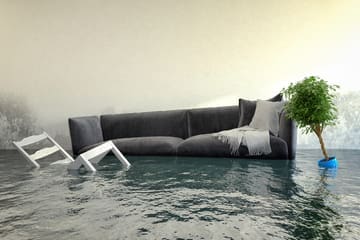
Water damage is one of the biggest fears of homeowners’ everywhere. Fortunately for them, this kind of property deterioration is also a common claim that standard home insurance policies usually cover. However, there are a few exceptions in which water damage is not part of your insurance agreement.
This guide by the experts of Haas Properties will illustrate when the homeowner insurance covers water damage, and when you need to pay for potential repairs out of your own pocket.
Water damage covered by the insurance policy
There are several ways in which water can infiltrate your foundation, flood your basement, and weaken the structure of your home. These unfortunate events may result from excessive rain, snow storms, or faulty plumbing. Other causes may include vandalism, sudden leakage, or mold.
All of these cases of water damage should be covered by your homeowner insurance policy. Most of these situations are unpredictable, difficult to prevent, or may result from hazardous negligence. Even the water damage that results from extinguishing a fire may be the subject of insurance policy coverage.
Depending on the effects of water damage, there are two clauses of your policy that will come into effect. These are:
Dwelling coverage
This part of your insurance will cover the costs of repairing the damage caused by natural hazards, plumbing accidents, mold, and vandalism.
Personal property coverage
Under this clause, the insurance covers personal possessions like furniture, electronics, or other assets that you have included in the policy and those that are affected by water damage. Keep in mind that cost limits may apply.
A mold infestation may result in water damage. To have its removal costs covered by the insurance policy, you will need to prove that its appearance is the product of a plumbing defect and not the result of inattention on your part to solve the issue.
Water damage that the homeowner insurance policy does not cover
Most insurance companies cover the repair costs of water damage that results from these causes. However, they will not cover damages that result from negligence and poor maintenance. Therefore, it is up to you to ensure the maintenance of the plumbing system and the foundation to prevent destruction from seepage and flooding.
Here are the main situations that you need to address before they become insurable water damage cases not covered by the homeowner insurance policy:
Water damage from unfixed plumbing issues
A sudden malfunction of the plumbing system is usually the subject of home insurance policies. However, the carelessness in fixing a pipe leak or another plumbing defect that results in water damage will prove costly since the insurance does not cover the homeowner’s poor upkeep conditions.
Water damage from exterior sewers
A standard insurance policy will not cover the repair costs if your house suffers any type of damage from water coming in from exterior sewers. These rare cases of flooding from public drains can be part of an additional policy. One that addresses water damage specifically.
Repair costs of your personal goods that cause water damage
If your washing machine suffers deterioration as a result of water damage, the insurance may cover a part of or the entire repair costs. However, if the same washing machine caused the water damage, the policy will not cover its repair or replacement. The insurance will only cover the costs of repairing the destruction produced by the faulty appliance, such as the floors or the foundation among others.
Flooding
A homeowners’ insurance policy does not cover any type of water damage that results from flooding. This isregardless of the reason behind this unfortunate accident. Your house may suffer from floods that come from overflowing bodies of water, storms,or waterlogged ground around the house. For these particular types of water damage, you will need to apply for a separate insurance policy.
How to ensure you meet the insurance coverage for water damage
Sometimes, recovering the money you invested for repairing water damage from the insurance company may prove to be a nuisance. To make sure that you meet the required terms, you will need to:
- Have a good understanding of the insurance policy terms and conditions
- Do regular checkups of the plumbing system and home appliances that use water
- Keep a record of all the repairs you make to the plumbing system, including the contact details of the contractors and professionals that perform these repairs
If you have a claim for water damage denied by the insurance company, and you feel that it was wrongfully rejected, you can approach the assistance of a lawyer or a licensed professional in the field of homeowners’ insurance. You always have the option of reviewing your file together with the insurance provider, so sustaining your claim is the best course of action.


